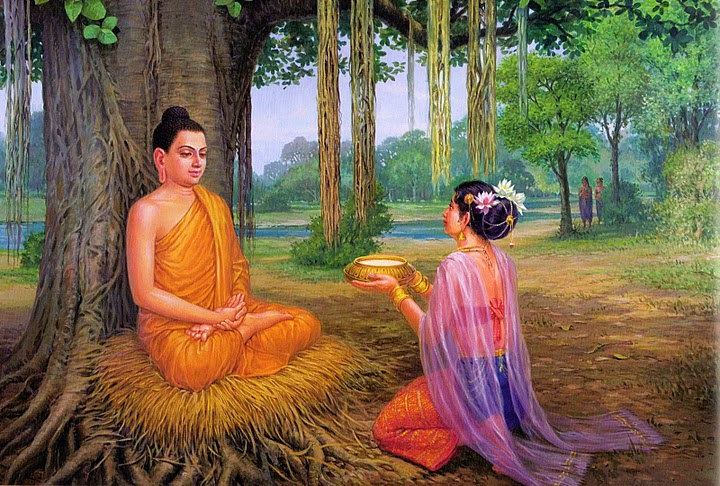How do you approach food? Do you love it, or do you hate it? Some people like food so much that they develop strong attachment in eating, while others dislike food so much that they develop an aversion to eating. The Buddha himself suggested the middle way: After going through both extremes, as a prince and as an ascetic, He concluded that neither is the ultimate way, and resumed regular food intake after 6 years of ascetic practices.
In the beginning of this sutra, we can see the Buddha himself demonstrating the middle way as a normal human in the world: He works (sharing blessings in exchange for food), eats, cleans (washing feet), and rests (sit). Here we see the same normalness as described by Laozi in Daodejing Chapter 70 – “saints can look like a normal person living a normal life, while living with wisdom and everlasting peace.”
Borrowing and applying the famous Chinese cook Martin Yan’s famous phrase: If the Buddha can eat, so can we!
* * *
法会因由分第一
THE REASONS FOR THE DHARMA ASSEMBLY, ONE
如是我闻。一时佛在舍卫国。祗树给孤独园。与大比丘众。千二百五十人俱。尔时,世尊食时,著衣持钵,入舍卫大城乞食。于其城中,次第乞已,还至本处。饭食讫,收衣钵,洗足已,敷座而坐。
Thus I have heard. Once upon a time, the Buddha sojourned in the Jetavana park near Sravasti with an assembly of twelve hundred and fifty bhiksus. One day, at mealtime, the World Honored One put on His robe, took His bowl, and entered the great town of Sravasti to beg for His food. He had begged from door to door, He returned to His place. When He had taken His meal, He put away His robe and bowl, washed His feet, arranged His seat and sat down.你怎么看待食物? 你爱它,还是恨它?有些人非常喜欢食物,以至于无美食不欢; 另外一些人不喜欢食物,以至厌恶进食。佛陀在经历两个极端后(出生为一个王子,后来六年苦行修行),提议不落极端的中道。
在此经的开头,我们可以看到佛陀以身作则的示范中道:他和一般人一样,工作(分享祝福,换取食物),吃饭,清洗(洗脚)和休息(坐)。这与老子在道德经第70章所描述的(是以圣人被褐怀玉)非常相似。圣人虽然里面的怀宝藏,但在世界中也过着正常人的生活。看似平凡,实不平凡。
* * *
法会因由分第一
如是我闻。一时佛在舍卫国。祗树给孤独园。与大比丘众。千二百五十人俱。尔时,世尊食时,著衣持钵,入舍卫大城乞食。于其城中,次第乞已,还至本处。饭食讫,收衣钵,洗足已,敷座而坐。


Leave a Reply